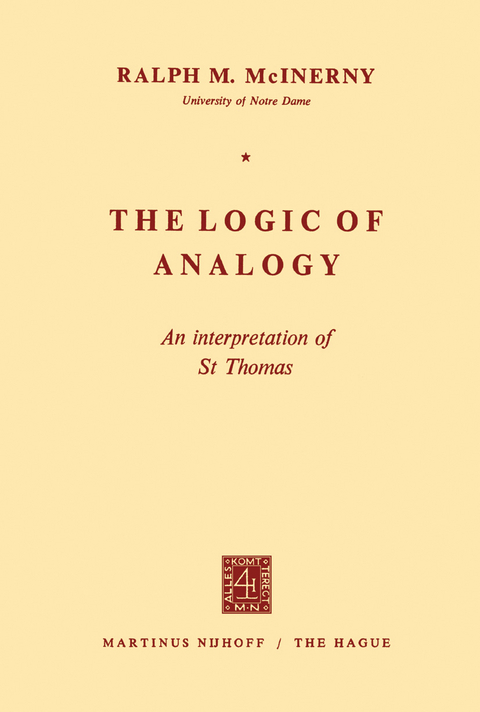
The Logic of Analogy
Kluwer Academic Publishers (Verlag)
978-90-247-0104-9 (ISBN)
I. The Problem of Analogy.- 1. Cajetan on Analogy.- (a) De nominum analogia.- (1) Analogy of Inequality.- (2) Analogy of Attribution.- (3) Analogy of Proportionality.- (b) The Commentary on Summa theologiae.- 2. Sylvester of Ferrara.- II. Logic and Analogy.- III. The Nature of Logic.- 1. Beings of Reason and the Subject of Logic.- 2. The Logical and Real Orders.- IV. The Significatïon of Names.- 1. Logic and Naming.- 2. Sign and Signification.- 3. The Imposition of Names.- 4. Modus signicandi; res significata.- 5. Ratio quam significat nomen.- 6. Signification and Supposition.- V. The Analogy of Names.- 1. Things Named Equivocally.- 2. Things Named Univocally.- 3. Things Named Analogically.- VI. The Division of Analogy.- 1. Multorum ad unum, Unius ad alterum.- 2. Proportion and Proportionality.- 3. Extrinsic Denomination and Analogous Names.- 4. Aliquid dicitur secundum analogiam tripliciter.- (a) Secundum intentionem, non secundum esse.- (b) Secundum esse, non secundum intentionem.- (1) Genus logice loquendo.- (2) Genus physice loquendo.- (3) Univocal or analogous?.- (4) Who is the logicus?.- (c) Secundum intentionem, secundum esse.- 5. Summary.- VII. The Analogical Cause.- 1. Diversus modus existendi impedit univocationem.- 2. Predication and Causality.- 3. Primum in aliquo genere.- VIII. Knowledge and Analogy.- 1. Justice and Analogy.- 2. Proportion and Quantity.- 3. Our Knowledge of Prime Matter.- 4. Proportionality, Metaphor, Analogous Names.- IX. The Divine Names.- 1. Can God be Named by Us?.- 2. Why Many Divine Names?.- 3. Omne nomen cum defectu est.- 4. Ordo nominis, ordo rerum.- X. Concluding.- Appendix: Table of texts cited.- Index rerum et nominum.
| Zusatzinfo | X, 184 p. |
|---|---|
| Verlagsort | Dordrecht |
| Sprache | englisch |
| Maße | 155 x 235 mm |
| Themenwelt | Geisteswissenschaften ► Philosophie ► Allgemeines / Lexika |
| Geisteswissenschaften ► Philosophie ► Logik | |
| ISBN-10 | 90-247-0104-X / 902470104X |
| ISBN-13 | 978-90-247-0104-9 / 9789024701049 |
| Zustand | Neuware |
| Informationen gemäß Produktsicherheitsverordnung (GPSR) | |
| Haben Sie eine Frage zum Produkt? |
aus dem Bereich


